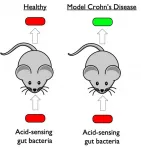(Press-News.org) Patients at high risk for cardiovascular events who had the highest levels of eicosapentaenoic acid (EPA) in their blood one year after taking daily omega-3 carboxylic acid, a prescription-grade fish oil, had similar rates of major cardiovascular events as people taking a corn oil placebo, according to a secondary analysis of the STRENGTH trial presented at the American College of Cardiology's 70th Annual Scientific Session. Researchers also found no increase in cardiovascular events among patients with the highest levels of docosahexaenoic acid (DHA) compared to placebo.
The impetus for this post-hoc analysis was to further examine the strikingly divergent results between STRENGTH and REDUCE-IT, another large, randomized clinical trial that used a different omega-3 fatty acid formulation (icosapent ethyl, purified EPA only) and mineral oil as the placebo.
"This is an intensely controversial area. One fish oil trial after another has been neutral, but REDUCE-IT reported a striking 25% reduction in events compared with a placebo pill containing mineral oil. But in our analysis, among patients treated with fish oil we found no evidence that EPA is beneficial or that DHA is harmful," said Steven Nissen, MD, MACC, cardiologist at Cleveland Clinic and the study's lead author. "So, we have many patients taking fish oils but no evidence that they have favorable effects on the heart."
The double-blind, multicenter STRENGTH trial enrolled 13,078 people at high risk for major cardiovascular events from 675 sites in 22 countries between Oct. 30, 2014 and June 14, 2017. Patients were randomized to receive either four grams daily of omega-3 carboxylic acid (a combination of EPA and DHA) or corn oil as the placebo. As previously reported, researchers found no difference between the two groups in terms of the primary outcome--a composite of cardiovascular death, heart attack, stroke, need for procedures to open blocked arteries or chest pain that required hospitalization.
This remained true in the current analysis, which examined a subset of 10,382 patients (5,175 receiving omega-3 carboxylic acid and 5,207 in the corn oil group) with available omega-3 fatty acid levels. Events occurred in 11.1% of patients treated with fish oil and 11% of patients in the placebo group. Overall, this group of patients was 62.5 years old on average, one-third were women and another third had diabetes.
Researchers grouped patients into thirds (tertiles) based on achieved EPA and DHA levels assessed through bloodwork at baseline and 12 months after randomization. The median plasma EPA level for patients taking fish oil was 89 (46-131) μg/mL and 91 (71-114) μg/mL for DHA, with the top tertile achieving levels of 151 (132-181) and 118 (102-143) μg/mL, respectively.
Researchers found no difference in the occurrence of the prespecified primary outcome among patients treated with omega-3 carboxylic acid who were in the top tertile of achieved EPA levels at one year compared with events seen in patients treated with corn oil; the event rate was 11.3% and 11%, respectively. For the top tertile of achieved DHA, the event rate was 11.4%. Researchers said they would have expected to see a difference in events among these patients if higher levels of EPA have a protective role. Further analyses examined changes in EPA or DHA over time and similarly showed neutral effects on cardiovascular outcomes.
"To be thorough, we looked at the data multiple ways--absolute EPA and DHA levels, change in levels of these omega-3 fatty acids, red blood cell levels, and by primary and secondary prevention subgroups," Nissen said. "All of these analyses showed no benefits or harms."
Nissen said there are several possible reasons for the very different results emerging from the STRENGTH and REDUCE-IT trials.
"It could be that EPA really is beneficial or it could be that the administration of DHA in STRENGTH could have caused harm, thereby undermining the benefits of EPA; however, the current study found no benefit from EPA and no harm from DHA," he said. "Alternatively, the differing results from these studies could have occurred because REDUCE-IT used mineral oil as the placebo, resulting in a false positive trial. Unlike corn oil, which is inert, mineral oil has major adverse effects. If you give a toxic placebo, then the active drug may look really good."
In the STRENGTH trial, the top tertile of achieved median EPA level was 151 μg/mL, which compares favorably with the median level reported in the REDUCE-IT trial (144 μg/mL).
Nissen said that if there is no benefit of fish oil in preventing major cardiovascular events, the potential harms must then be considered. Although the absolute numbers were small, there was a 69% increase in new onset atrial fibrillation, a dangerous heart rhythm disorder, among individuals taking fish oil, which occurred in 2.2% of patients in the fish oil group compared with 1.3% of those taking corn oil.
"Fish oils increase the risk of atrial fibrillation substantially, and there is no solid evidence that they help the heart in anyway," Nissen said. "It's a sad story for cardiology."
A key limitation of the study is that it is a post-hoc analysis.
INFORMATION:
This study was simultaneously published online in the JAMA Cardiology at the time of presentation. The original STRENGTH trial was funded by AstraZeneca.
Nissen will be available to the media in a virtual press conference on Sunday, May 16, at 9:45 a.m. ET / 13:45 UTC.
Nissen will present the study, "Relationship Between Omega-3 Fatty Acid Levels and Major Adverse Cardiovascular Outcomes in Patients with High Cardiovascular Risk," on Sunday, May 16, at 8 a.m. ET / 12:00 UTC, virtually.
ACC.21 will take place May 15-17 virtually, bringing together cardiologists and cardiovascular specialists from around the world to share the newest discoveries in treatment and prevention. Follow @ACCinTouch, @ACCMediaCenter and #ACC21 for the latest news from the meeting.
The American College of Cardiology envisions a world where innovation and knowledge optimize cardiovascular care and outcomes. As the professional home for the entire cardiovascular care team, the mission of the College and its 54,000 members is to transform cardiovascular care and to improve heart health. The ACC bestows credentials upon cardiovascular professionals who meet stringent qualifications and leads in the formation of health policy, standards and guidelines. The College also provides professional medical education, disseminates cardiovascular research through its world-renowned JACC Journals, operates national registries to measure and improve care, and offers cardiovascular accreditation to hospitals and institutions. For more, visit ACC.org.
Media Contacts
Nicole Napoli
202-669-1465
nnapoli@acc.org
Thy-Ann Nguyen
703-479-3642
thyann.nguyen@curastrategies.com
Dapagliflozin, a sodium-glucose cotransporter 2 (SGLT2) inhibitor, did not significantly reduce the risk of organ failure or death or improve recovery in patients hospitalized with COVID-19 who are at high risk of developing serious complications compared to placebo, according to data presented at the American College of Cardiology's 70th Annual Scientific Session. The researchers, while acknowledging the results were not statistically significant, said they were encouraged by the lower numbers of organ failure and deaths observed in patients treated with dapagliflozin and by favorable safety ...
Older patients hospitalized with acute heart failure who participated in a novel 12-week physical rehabilitation (rehab) program tailored to address their specific physical impairments had significant gains not only in physical functioning but also quality of life and depression compared with those receiving usual care, regardless of their heart's ejection fraction, according to a new study presented at the American College of Cardiology's 70th Annual Scientific Session. Participation in the program, however, did not significantly reduce rehospitalizations during the six-month follow up.
Heart failure, which ...
Taking medications to protect the heart from damage associated with adjuvant breast cancer therapy--medications that are administered in addition to surgery to remove a tumor--did not significantly improve markers of heart health two years after breast cancer treatment, according to a study presented at the American College of Cardiology's 70th Annual Scientific Session.
The researchers reported no significant differences between patients who took an angiotensin receptor blocker (candesartan cilexetil) or a beta-blocker (metoprolol succinate) compared with placebos in terms of left ventricular ejection fraction (LVEF), a measure of the heart's ability to effectively pump ...
Rivaroxaban, in addition to low-dose aspirin, significantly reduced the occurrence of total severe events of the heart, limb or brain and issues related to other vascular complications in patients with symptomatic peripheral artery disease (PAD) who underwent lower extremity revascularization, a procedure to open blocked arteries in the leg. The findings, presented at the American College of Cardiology's 70th Annual Scientific Session, expand on earlier data and underscore the broad absolute benefits of this strategy in this high-risk patient population, researchers said.
"To our knowledge, this is the first time that the addition of low-dose rivaroxaban to aspirin has been clearly shown to reduce ...
In patients who had a coronary stent inserted after experiencing the most severe type of heart attack, the use of a technique that measures blood flow and pressure through a partially blocked artery to determine if a second stenting procedure is needed did not improve outcomes and was more costly than using angiography, or a heart X-ray, alone to guide the procedure, according to research presented at the American College of Cardiology's 70th Annual Scientific Session.
"The strategy of using fractional flow reserve (FFR) to guide the stenting procedure is not superior to the standard technique of using angiography to treat additional partially blocked arteries," said Etienne Puymirat, MD, professor of cardiology at the University of Paris, director of intensive care at the Georges ...
HOUSTON - (May 17, 2021) - In an important step toward the clinical application of synthetic biology, Rice University researchers have engineered a bacterium with the necessary capabilities for diagnosing a human disease.
The engineered strain of the gut bacteria E. coli senses pH and glows when it encounters acidosis, an acidic condition that often occurs during flareups of inflammatory bowel diseases like colitis, ileitis and Crohn's disease.
Researchers at the University of Colorado (CU) School of Medicine used the Rice-created organism in a mouse model of Crohn's disease to show acidosis activates a signature set of genes. The corresponding ...
Humans leave their "footprints" on the land area all around the globe. These land-use changes play an important role for nutrition, climate, and biodiversity. Scientists at the Karlsruhe Institute of Technology (KIT) combined satellite data with statistics from the past 60 years and found that global land-use changes affect about 32 percent of the land area. This means that they are about four times as extensive as previously estimated. The researchers publish their findings in the scientific journal Nature Communications.
Whether it is deforestation, urban growth, agricultural expansion, or reforestation - land-use changes are diverse and have ...
Researchers from Tohoku University have developed a new numerical method that paves the way for simulating landslide tsunamis.
Their research was published in the journal Computational Mechanics on May 13, 2021.
Landslides occurring on land or underneath the sea - known as subaerial and submarine landslides respectively - can cause devastating tsunamis. They also pose other hazards such as severing submarine cables and pipelines.
Yet the mechanisms at play behind these landslides are less well understood, partly due to the multifaceted interactions taking place: a collapse of the seabed and/or the interaction between soil and water. Conventional approaches make it difficult to ...
Clinics that mailed mifepristone and misoprostol tablets to patients during the pandemic have experienced a high demand and have been able to safely screen and care for patients via telehealth, according to two studies recently published online in the journal Contraception.
The first study identifies factors that supported the provision of abortion pills across four healthcare settings. Factors that contributed to success included clinic staff helping to organize the telehealth appointment and to distribute pills, the first paper noted, as well as already having telehealth ...
Doctors often recommend Omega-3s to help patients lower their cholesterol and improve heart health. Those Omega-3s can come from fatty fish like salmon and mackerel, or supplements that often contain a combination of the acids eicosapentaenoic acid (EPA) and docosahexaenoic acid (DHA).
Now, new research from the Intermountain Healthcare Heart Institute in Salt Lake City finds that higher EPA blood levels alone lowered the risk of major cardiac events and death in patients, while DHA blunted the cardiovascular benefits of EPA. Higher DHA levels at any level of EPA, worsened health outcomes.
Results of the Intermountain study, which examined nearly 1,000 patients over a 10-year-period, will be presented virtually at the ...


